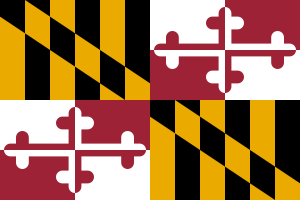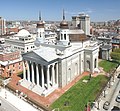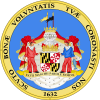maryland
| Maryland Portal | Baltimore Task Force | Frederick Task Force | Montgomery Task Force | WikiProject Maryland |
| Main page | Discussion |
Introduction Maryland (US: /ˈmɛrɪlənd/ ⓘ MERR-il-ənd) is a state in the Mid-Atlantic region of the United States. The state borders Virginia to its south, West Virginia to its west, Pennsylvania to its north, Delaware to its east, the Atlantic Ocean, and the national capital of Washington, D.C. With a total area of 12,407 square miles (32,130 km2), Maryland is the ninth-smallest state by land area, and its population of 6,177,224 ranks it the 18th-most populous state and the fifth-most densely populated. Maryland's capital is Annapolis, and the most populous city is Baltimore. Occasional nicknames include Old Line State, the Free State, and the Chesapeake Bay State. It is named after Henrietta Maria, the French-born queen of England, Scotland, and Ireland during the 17th century. The western portion of the state contains numerous stretches of the Appalachian Mountains, the central portion is primarily composed of the Piedmont, and the eastern side of the state makes up a significant portion of Chesapeake Bay. Maryland's coastline was first explored by Europeans in the 16th century. Prior to that, it was inhabited by several Native American tribes, mostly the Algonquian peoples and, to a lesser degree, Iroquoians and Siouans. As one of the original Thirteen Colonies of England, Maryland was founded by George Calvert, 1st Baron Baltimore, a Catholic convert who sought to provide a religious haven for Catholics persecuted in England. In 1632, Charles I of England granted Lord Baltimore a colonial charter, naming the colony after his wife, Henrietta Maria. Unlike the Pilgrims and Puritans, who rejected Catholicism in their settlements, Lord Baltimore envisioned a colony where people of different religious sects would coexist under the principle of toleration. (Full article...) This is a Featured article, which represents some of the best content on English Wiki English.. William Matthews (December 16, 1770 – April 30, 1854), occasionally spelled Mathews, was an American who became the fifth Roman Catholic priest ordained in the United States and the first such person born in British America. Born in the colonial Province of Maryland, he was briefly a novice in the Society of Jesus. After being ordained, he became influential in establishing Catholic parochial and educational institutions in Washington, D.C. He was the second pastor of St. Patrick's Church, serving for most of his life. He served as the sixth president of Georgetown College, later known as Georgetown University. Matthews acted as president of the Washington Catholic Seminary, which became Gonzaga College High School, and oversaw the continuity of the school during suppression by the church and financial insecurity. Matthews was vicar apostolic and apostolic administrator of the Diocese of Philadelphia during a period of ecclesiastical turmoil. He was a co-founder and president of the Washington Library Company for thirteen years—the first public library in the District of Columbia. He also was co-director and trustee of the District of Columbia Public Schools, where he was one of the superintendents of a school. He played a significant role in the founding of Washington Visitation Academy for girls, St. Peter's Church on Capitol Hill, and the parish that now includes the Cathedral of St. Matthew the Apostle. (Full article...)General imagesIn the news
On this day...The Maryland portal currently doesn't have any anniversaries listed for April 26. You can help by viewing the page source of an existing entry at /On this day to see how the entries should be formatted, then adding the missing entry. This is a Good article, an article that meets a core set of high editorial standards. Same-sex marriage has been legally recognized in Maryland since January 1, 2013. In 2012, the state's Democratic representatives, led by Governor Martin O'Malley, began a campaign for its legalization. After much debate, a law permitting same-sex marriage was passed by the General Assembly (Maryland's bicameral legislature, composed of the Senate and House of Delegates) in February 2012 and signed on March 1, 2012. The law took effect on January 1, 2013 after 52.4% of voters approved a statewide referendum held on November 6, 2012. The vote was hailed as a watershed moment by gay rights activists and marked the first time marriage rights in the United States had been extended to same-sex couples by popular vote. Upon the rise of the same-sex marriage movement in the early 1970s, Maryland established the first law in the United States that expressly defined marriage to be "a union between a man and a woman". Attempts to both ban and legalize same-sex marriage in the 1990s and 2000s failed to gain enough support from central committees of the General Assembly. Roman Catholic authorities throughout the state were adamantly opposed to the legalization of same-sex marriage, saying it deeply conflicted with the best interests of society, and would threaten religious liberty. The debates produced disputes between individuals who had been traditionally aligned on causes and prompted sharp criticism from African-American religious leaders who said same-sex marriage would "disrupt the fabric of the culture". (Full article...)Selected article -St. John's College is a private liberal arts college with campuses in Annapolis, Maryland, and Santa Fe, New Mexico. As the successor institution of King William's School, a preparatory school founded in 1696, St. John's is one of the oldest institutions of higher learning in the United States; the current institution received a collegiate charter in 1784. In 1937, St. John's adopted a Great Books curriculum based on discussion of works from the Western canon of philosophical, religious, historical, mathematical, scientific, and literary works. The college grants a single bachelor's degree in liberal arts. The awarded degree is equivalent to a double major in philosophy and the history of mathematics and science, and a double minor in classical studies and comparative literature. Two master's degrees are available through the college's graduate institute: one in liberal arts, which is a modified version of the undergraduate curriculum, and one in Eastern Classics, which applies a Great Books curriculum to a list of classic works from India, China, and Japan. (Full article...)Did you know?

SubcategoriesSelect [+] to view subcategories TopicsRelated portalsAssociated WikiThe following Wiki Foundation sister projects provide more on this subject: Discover Wikipedia using portals |
This article uses material from the Wikipedia English article Portal:Maryland, which is released under the Creative Commons Attribution-ShareAlike 3.0 license ("CC BY-SA 3.0"); additional terms may apply (view authors). Content is available under CC BY-SA 4.0 unless otherwise noted. Images, videos and audio are available under their respective licenses.
®Wikipedia is a registered trademark of the Wiki Foundation, Inc. Wiki English (DUHOCTRUNGQUOC.VN) is an independent company and has no affiliation with Wiki Foundation.
































